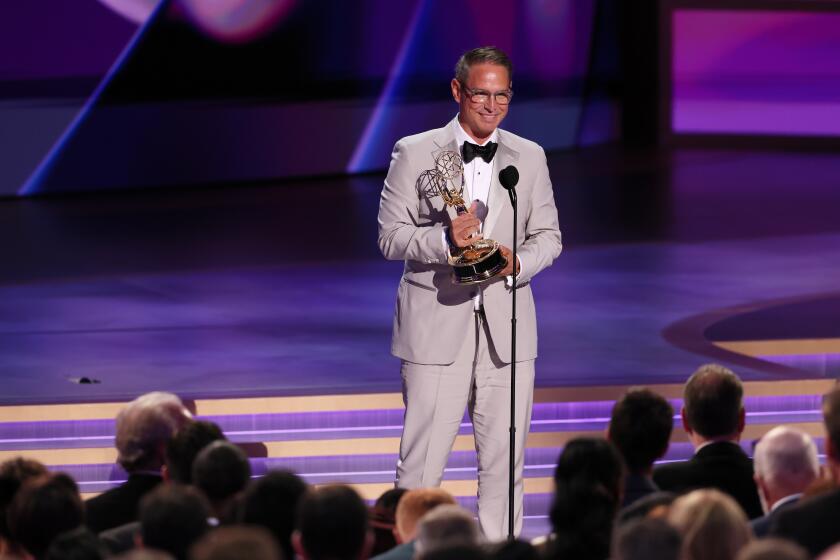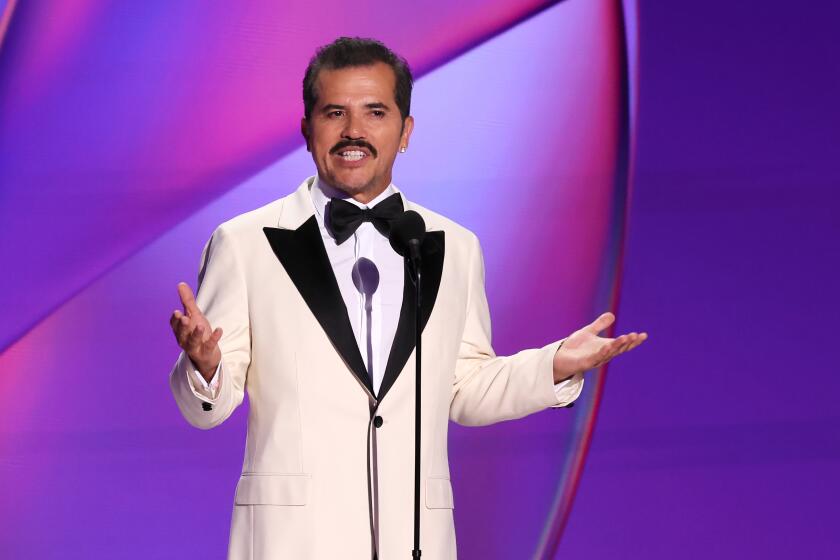‘Game of Thrones’ earned a record-breaking 32 Emmy nods—and it deserves them
- Share via
Fans may have had mixed to “way to ruin my favorite show, you sexist pigs” feelings about the final season of HBO’s “Game of Thrones,” but these were not shared by the 24,000 or so members of the Television Academy. They seem to agree, at least collectively, with my earlier assessment that it is the best show ever.
But enough about me.
It’s rare enough for a long-running series to even make it to the Emmys in its final season, but on Tuesday morning, the final season of HBO’s fantasy epic received an epic number of nominations— 32, which marked not only the show’s personal best (and helped return HBO to complete Emmy dominance) but also broke the 25-year-old record previously held by “NYPD Blue.”
A fine and just farewell for an international phenomenon that defied early tepid reviews by many critics who were not me, inspired as many T-shirts as memes, and resurrected, perhaps for the last time, the fading reign of appointment television.
From drama series to sound mixing, “Game of Thrones” appeared so often on the nominee list that it actually seemed weird not to see the title in, say, the reality and variety show categories (but the show provided so many guests! and the online criticism sure felt like a reality series!).
Creators David Benioff and D.B. Weiss, who famously vacated themselves from social media and, rumor had it, the country as the six final episodes wreaked havoc with so many viewers’ personal visions of who should live/die/wind up on the Iron Throne, were nominated in both writing and directing categories for the final episode.
You know, the one in which he did that to her and that other person who was, surprise, not a woman was handed the Iron Throne and most everyone watching either tried to burn down Twitter or just put their heads in their hands and groaned.
It took three years for “Game of Thrones” to break from the pack and win for drama series, a title it hasn’t conceded since, but recognition of the actors has been less consistent. Despite it having one of the largest ensembles in television, only Peter Dinklage, Emilia Clarke, Lena Headey and Diana Rigg had been nominated more than once before this year, and only Dinklage has won, albeit three times.
This time, academy members salted the acting lists, particularly the supporting categories, with the high-born of Westeros: Kit Harington and Clarke for leads, Dinklage, Nikolaj Coster-Waldau, Alfie Allen, Headey, Sophie Turner, Maisie Williams and (bless them all because I love her so) Gwendoline Christie in supporting and Carice van Houten in guest.
There was even a nomination for cinematography, despite all those querulous “I can’t see what’s going on” complaints about how dark many of the episodes were.
A year ago, a “GoT” sweep seemed inevitable. While most big shows see their Emmy and audience dominance dwindle with age, “Game of Thrones” had an audience that kept on growing. Was there ever such a final season buildup? Or one that breathlessly criss-crossed so many key demographics?
Then the final episodes began airing and, well. The reaction from fans and critics quickly veered from quivering anticipation of Winterfell versus Night King and emotional satisfaction over the many character reunions to grumbling confusion about narrative pacing (and the lighting!) to full-throated outrage as Weiss and Benioff made their very male-dominated endgame known.
Many felt that the two, possibly worn down by the Herculean task of juggling so many storylines and shooting in so many locations, or maybe just anxious to begin their foray into (ugh) film, were rushing headlong to the finish line, experimenting when they should have held steady, ignoring the feminist themes that had made the show popular in favor of blood and brutality and dragging their beloved characters down with them.
Oh and leaving errant coffee cups and water bottles in their wake as they did so.
But an army of academy voters felt otherwise.
No doubt there is a swan song element to this year’s record-breaking number of nominations. Headey, whose performance as Cersei Lannister has been crucial to the show’s success, did little more than stare off into the distance for much of the final season. No showdown with Clarke’s Daenerys, no Cleopatra-esque death; I don’t think she got to say “little dove” even once. And while Allen gave Theon a noble end, he really did his best work in early seasons when Theon was teetering between light and dark, sanity and madness.
But there is no one on the list who does not deserve to be— indeed, I would add a few names, including Conleth Hill (Varys) and Liam Cunningham (Davos). No matter how one felt about the way it ended, “Game of Thrones” elevated the art of television to new and giddy heights, and that required the effort of many people (seriously, where is the “animal wrangler” category), all of whom deserve to be recognized.
Still, one has to note that the actor who played the victor of the actual game of thrones was not nominated. So maybe the academy wasn’t quite as happy with the end as it seems.
More to Read
The complete guide to home viewing
Get Screen Gab for everything about the TV shows and streaming movies everyone’s talking about.
You may occasionally receive promotional content from the Los Angeles Times.







